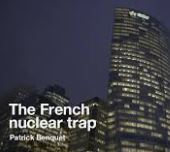
Le Monde: EDF collapses on the stock market amid difficult negotiations in Brussels
EDF is the largest nuclear operator in Europe and one of the main producers of electricity in the world, but a few lines were enough to make its value skid on the stock market on Monday 25 January. In an article published on the BFM Business website on Monday morning, the channel said that negotiations between Paris and Brussels on one of the key points of French nuclear reform are failing. In a matter of minutes, the group’s stock collapsed and lost as much as 18% in the afternoon to close at -15%. A day of tumbling stopped at the last minute by an intervention from Bercy, who did everything to deny the failure of the negotiations.
To understand this dark day for the electrician, we must return to the very subject of the negotiations. For months, France has been pleading with the European Commission for a reform of the complex system which requires EDF to resell part of its production to its competitors. Set up in 2011, this mechanism called “regulated access to historic nuclear electricity” (Arenh) forces the energy company to resell a quarter of its nuclear output at a fixed price – this tariff is set at 42 euros per megawatt hour.
The group’s executive and management believe that this scheme, which aims to promote competition, is too unfavourable to EDF – and endangers a company 83% owned by the State. Against a more favourable device and price, EDF CEO Jean-Bernard Lévy set up a project called “Hercule” which strongly reorganizes the group, creating several entities. The objective: to convince the European Commission that the energy company is ready to play the game of competition in exchange for more sustainable market conditions.
Article reserved for our subscribers Read also Nuclear: “The state of the French fleet is worrying”
For weeks, several financial analysts have counted on the success of these negotiations, with the idea that an agreement could be found around 48 euros per megawatt hour. The share has therefore risen steadily since the start of the year, already incorporating this prospect into the price. But, for several days, the negotiations seem not to advance as quickly as hoped by the French government.
“Negotiations are not easy”
The publication of the BFM Business article sent the share price plunging because it disappointed the expectations of some investors who believe that a deal in Brussels would boost EDF’s value. BFM mentioned in particular an additional time for negotiations. “However, this article seems sufficiently well informed to lead us to consider that this could be the case and that a dead end could have been reached, surprising as it may seem”, one thus reads in a note of the bank JP Morgan, reported by Reuters.
In an attempt to curb this tumble, the Ministry of the Economy hastened to deny this information: “It was not requested, in any way, additional time” to complete this negotiation, assures- one in Bercy, contrary to information from BFM. “Negotiations are not easy, it is true, but they are continuing,” said another government source. These are simply market rumours, but it is true that they demonstrate the fragility of EDF. ”
The CEO of the French group and the government have made the reform of nuclear compensation – and the “Hercules” plan which is presented as its counterpart – the alpha and omega of the group’s future. This prospect is denounced by the company’s unions, who also reject the Arenh device, but oppose “Hercules”, which they accuse of being a “dismantling” of the French champion of electricity.
They have been joined in recent days by several deputies and senators from the opposition left and right, who challenged the government in session on the subject. The National Federation of Granting Authorities and Regies, which brings together a large number of local authorities, has also expressed its strong opposition to the project. The government maintains that it will only give Brussels its consent to launch the major manoeuvres if the integrity of the group is maintained. But time is running out: if no agreement is reached in the coming weeks, the executive will have great difficulty in launching this reform before the presidential election.

